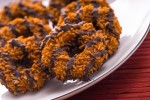One chip. Two chips. Three chips. Then, the whole bag. And maybe a Twix bar, too.
I’m sure you can relate. It’s a phenomenon that affects even the best of us – stress eating. You eat because you’re stressed. Then you’re stressed because you eat.
I often find myself justifying my eating habits with reasons other than stress. It is more interesting than what I’m studying. It keeps me awake. I also use food to reward myself – every problem completed or paragraph read or flashcard learned, I get a chip or M&M or whatever snack is lingering in my kitchen. I eat because it helps me study, not because I’ve become a slave to food.
By the end of finals, the regret sinks in. Instead of a satisfying lightness as the stress finally departs, an uncomfortable heaviness settles in. It’s a fullness, gained in one measly week, that that could challenge the “freshman 15,” gained across a whole year. Lack of time to make it to the gym does nothing to help, either.
And that’s how finals leaves you — exhausted and carrying a few extra pounds you really wish you didn’t have, as you sit and wait to see if your studying actually paid off.
On the upside, you are not alone. The stress-eating phenomenon has become somewhat common. According to the American Psychological Association, millennials are significantly more likely to stress eat than any other generation: 50% compared to only 36% of Generation Xers. It sweeps away many of us, whether we’d care to admit it or not. So what is stress eating all about? What is it about stress that drives us to do something so seemingly unrelated to a stress response?
On a basic level, eating is simply one of your body’s mechanisms of relieving stress’ discomfort and seeking pleasure. Of course, other things help as well. Meditating, exercising and focusing on the present are healthy ways to deal with stress. But food can sometimes become a crutch.
It turns out the answer is largely biological. Stress activates your fight or flight response, which induces the use of your adrenal glands. These release cortisol, and increased cortisol provokes cravings, particularly for high-calorie foods. Your body is designed against you – it’s simple as that.
What’s more, it is the high-calorie and fatty foods – the feel-good foods – that release the most dopamine. During a miserable study session, your brain is more likely to wander and dream about the cookie or bag of Límon Lay’s, as opposed to carrot sticks. Once you’ve done it once or twice, it becomes an ingrained habit — your brain feels worse without the sugar. And so it goes.
So what’s the way out? Is there a way to keep the stress (because let’s be honest, it can be a grade saver) and ditch the hormone-induced weight gain? Obviously not. But there are ways to deal with it.
Experts have shown that simple awareness leads to improvement. If you know that stress is what is causing those cravings, not hunger, it can be easier to ignore or redirect them. Mindfulness can be key — when feeling stressed, collect the negative feelings, acknowledge them and focus on breathing and relaxation as opposed to food. Snacking itself isn’t even horrible if you replace the fatty foods with healthy ones like nuts or veggies. Keep your mouth busy to help keep your mind busy. That’s what the experts say, at least.
While these techniques are fine, you might find them better in theory than in practice. Yes, you know the stress is there, but the fact of the matter is candy will indeed improve the immediate situation. In my opinion, straight abstinence isn’t effective. I end up obsessing about it much more than if I cave, and as such end up caving.
So I say, go ahead and give in. Treat yourself. Honestly, you deserve it. You’ve had 10 weeks of deadlines and papers and midterms and meetings. It’s the final stretch, and if a bowl of ice cream is going to bring you a bit of happiness, let it. Make an allowance, and mindfully enjoy every moment of it. But do so in moderation and with awareness of the effects. In the long run, one bowl of ice cream won’t make that significant of a difference, but binge-eating the whole tub will. Use discretion, and you’ll stay healthy.
